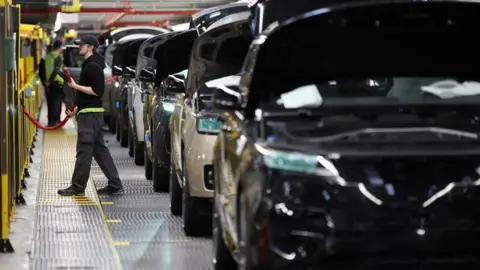'Trump's car tariffs will hit West Midlands worst'
 Reuters
ReutersA new 25% import tariff on cars and parts going to the US will impact the West Midlands more than any other region in the UK, an economist says.
Prof David Bailey says the Midlands, home to the likes of Jaguar Land Rover (JLR) and Aston Martin, is the "number one exporting region" of cars to the US.
Prof Bailey, of Birmingham Business School, said it was a "very worrying time" for the region's car industry after US president Donald Trump said the tariff would come into force on 2 April.
Car companies nationwide met industry minister Sarah Jones earlier to discuss their response to the president's proposal.
Coventry-based manufacturer JLR, which also has sites in Solihull and Wolverhampton, said it was "assessing the impact of the policy" announced by Trump.
The luxury car manufacturer Aston Martin, which has its headquarters in Gaydon, Warwickshire, has also been approached by the BBC for comment.
 PA Media
PA Media"It is the kind of premium and luxury end of things that are really affected, they have sold very well in the United States," Prof Bailey said.
Bentley, which is based in Crewe, as well as Rolls Royce which has a site in Solihull, would also be affected, he explained.
'Cars are UK's top export to US'
He described JLR as "the jewel in the crown" of the UK car industry and said one in four of its cars were currently sent to the US.
"The US is the second biggest market for the UK's industry after the European Union," Prof Bailey continued.
"Cars are the UK's number one goods export to the United States. This is a real problem for the industry."
However, he added that for a number of reasons, the industry was "already operating at very low volumes".
"Car plants have also been affected by slow sales in China, a stagnant EU market and high energy prices, and now this," he said.
Follow BBC Birmingham on BBC Sounds, Facebook, X and Instagram.
